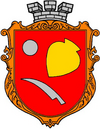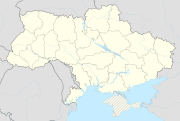Zhydachiv
| Zhydachiv | ||
| Жидачів | ||

|
|
|
| Basic data | ||
|---|---|---|
| Oblast : | Lviv Oblast | |
| Rajon : | Zhydachiv Raion | |
| Height : | 261 m | |
| Area : | 13.44 km² | |
| Residents : | 11,683 (2004) | |
| Population density : | 869 inhabitants per km² | |
| Postcodes : | 81700 | |
| Area code : | +380 3239 | |
| Geographic location : | 49 ° 23 ' N , 24 ° 8' E | |
| KOATUU : | 4621510100 | |
| Administrative structure : | 1 city | |
| Address: | вул. Шашкевича 2 81700 м. Жидачів |
|
| Website : | http://www.zhydachiv.in.ua/ | |
| Statistical information | ||
|
|
||
Schydatschiw ( Ukrainian Жидачів ; Russian Жидачев Schidatschew ; formerly Жидачов Schidatschow or Жидєчув Schidjetschuw , Polish Żydaczów ) is a western Ukrainian city with about 11,000 inhabitants.
The city is the administrative center of the raion of the same name and is located on the banks of the Stryj , about 52 kilometers south of the oblast capital Lviv .
history
Kievan Rus , Principality of Halych-Volodymyr
Udetsch is mentioned for the first time in 1164 . Remains of a large castle complex have been preserved from this time.
Kingdom of Poland
In 1301 a Catholic church was built. In 1349 the place came to the Kingdom of Poland . From this time on the name Zudaczyw or similar is in use. There may be a linguistic connection to the Slavic word żydy for Jews .
It became the seat of a powiat (district) of the Lviv country in the newly created Ruthenian Voivodeship from 1442.
The place received the Magdeburg city charter in 1393 . In the period between the 14th and 16th centuries, Zhydachiv is an important and fairly large city. Salt production and trade shape the place. It has two castles, fortifications, three Ukrainian churches, a Roman Catholic church, a market square and a wooden town hall.
From 1708 to 1718 there was an Augustinian monastery here .
Empire of Austria
Since 1772 Żydaczów belonged to the Austrian Galicia and in 1867 became the seat of the district of the same name , a district court was established in the place in 1882.
The rail link was opened in 1899.
Second Polish Republic
After the end of the First World War , the place came to Poland and was here from 1921 in the Stanislau voivodeship . At the end of the 1930s there were about 4200 inhabitants, 1200 Ruthenians, 1290 Poles and 950 Jews living in the city.
Ukrainian SSR
By the German-Soviet non-aggression pact , the city was added to the Soviet Union , there the city came to the Ukrainian SSR and was initially the capital of the Ujesd Schidjetschuw, from January 1940 then the capital of the Rajons of the same name in the newly formed Drohobych Oblast .
From 1941 to 1944 the city was occupied by Germany, which administered the place in the district of Galicia , after the reconquest by the Red Army the place became Ukrainian again.
In 1951, the largest paper-making combine in the Ukrainian Soviet Socialist Republic was put into operation in Schydatschiw, which is still the city's most important economic enterprise.
Ukraine
Since 1991 the city has been part of what is now Ukraine.
Economy and Infrastructure
The city is located on the Stryj - Chodoriw railway line and is relatively close to the M 06 international trunk road which leads from Chop (border with Slovakia and Hungary) via Lviv to Kiev . In addition to buses to Lemberg, Ivano-Frankivsk and Kalush , marshrutki are particularly important for public transport . Depending on the line, they run every 20 to 60 minutes, open up the surrounding villages and connect Zhydatschiv with the larger cities, also in competition with buses and trains. They are more expensive than buses and trains, but they run much more often and also open up small villages.
The paper mill is particularly important from an economic point of view. There is also a food and construction industry in and around Zhydatschiw. Zhydachiv is the trade center of the region and the retail trade is correspondingly pronounced.
religion
In addition to the predominant Greek Catholic Church , the Roman Catholic Church and Judaism are also deeply rooted in the city. Numerous churches and cemeteries bear witness to the city's multi-denominational history.
Personalities
Maurice Schwartz (1889–1960), American-Yiddish actor
Web links
Individual evidence
- ↑ Leontij Wojtowytsch : Schydatschiwske knjasiwstwo (1393-1442) ( Memento of the original from September 29, 2017 in the Internet Archive ) Info: The archive link was inserted automatically and has not yet been checked. Please check the original and archive link according to the instructions and then remove this notice. , P. 117. (Ukrainian)
- ^ Reichs-Gesetz-Blatt for the Empire of Austria. Year 1867, IX. Piece, No. 17: "Ordinance of the State Ministry of January 23, 1867"
- ↑ Reichsgesetzblatt of September 28, 1881, No. 113, page 369


